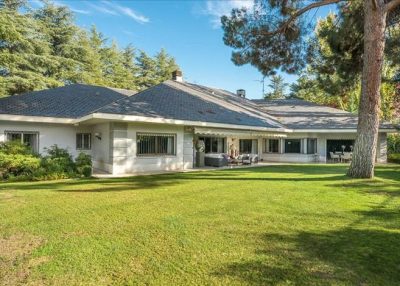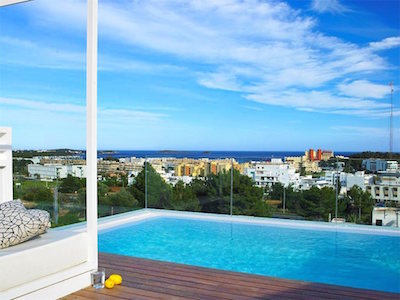Despite high unemployment and political conflict in the country, Spain’s prime real estate market is showing signs of life, according to a new report by Knight Frank.
Forecasts for Spain’s GDP growth show it outperforming the United Kingdom and Germany next year, and sales and prices are increasing noticeably in several high-end markets. The growth of non-European foreign buyers and developments intended to foster a luxury community has been instrumental in local recoveries.
"Since Spain turned a corner in 2014, raising its head from the depths of recession to outpace most Eurozone economies last year, select pockets of its mainland and islands have taken on a momentum of their own," said Mark Harvey, partner and head of Knight Frank’s Spanish network. "Spain is far from out of the woods altogether, political deadlock persists following two general elections in quick succession and unemployment remains high.
"But, the regions that Knight Frank specializes in -Madrid, Barcelona, Marbella, Mallorca and Ibiza - are seeing clear signs of recovery, each fueled by different forces,” he said.
Primetime
Images of a recession-plagued Spain are still fresh in the minds of many throughout the world, but in 2014 the country’s economic growth outpaced most in Europe. While this growth is far from nationwide, the activity on the high end of some of the nation’s biggest cities and most desirable islands has helped Spain recover.

Puerta de Hierro, Madrid, villa
In Madrid, 30 percent of buyers are overseas, with that share fueled largely by Latin American consumers. With many Latin American countries experiencing their own tough times, Madrid has emerged as an ideal place to relocate for those with children thanks to its lifestyle appeal and common language.
In the 12-month period ending April 2016, prime real estate increased a modest 2 percent, but in 2015 residential sales increased 27 percent from 2012. Low resale stock levels have kept values competitive in the city.
Barcelona is solidifying its presence as a viable luxury city, with a new super-yacht marina and a Mandarin Oriental hotel being key additions to the cityscape. As a result, over the same time periods specified above, prime neighborhoods have seen prices increase to the tune of 8 percent and an 86 percent sales jump.

Barcelona, Spain resort
Marbella has also staged a comeback, thanks in large part to new villas, beachfront properties and gated communities that are helping prime property outperform the lower 95 percent of the market. Knight Frank has observed increased interest in Marbella from Middle Eastern buyers in particular, but Russians, Britons and Northern Europeans are the most prolific foreign buyers.
British buyers were making headway in the city in 2015 as the pound gained on the euro. However, the recent vote to leave the European Union caused the pound’s value to crash (see story), so this trend may not continue.
The islands of Mallorca and Ibiza are both seeing fast growth due largely to increased demand from foreigners. While the percentage of sales increases is not as high as in the cities, price growth has been higher, and Ibiza in particularly is struggling to pace supply with demand.

View from a Town House for sale in Ibiza
Overall, foreign purchase has grown most among Latin Americans and Middle Easterners, Russians and Swiss since 2013. Thanks to surging interest among these groups, non-EU nations now comprise 40 percent of property purchases, up from 31 percent.
Markets in flux
While the report on Spain was written prior to UK voters opting to leave the European Union, Knight Frank addressed the market impacts of the decision in another report.
Despite immediate damages, the Brexit referendum’s long-term impact on the UK’s housing market will be minimal, according to the firm’s research.
Knight Frank anticipates near-term volatility and declines, some of which are already visible in the form of devalued currency and stock market drops, but real estate will likely remain a stable long-term investment. Real estate has always been a sector whose strengths must be examined in the long-term, and low supply and other underlying strengths of the U.K. bode well for the market (see story).
With many European markets fading or slowing, property growth has been highest in nations that are more recent entrants to the globalized economy.
Across global nations, housing prices increased by 3.4 percent in the year-long period ending March 31, Knight Frank’s Global House Price Index shows.
The growth rate is comparable to the increase Knight Frank found in prime global cities, suggesting stability on both regional and national scales. While major players are stumbling amid geopolitical volatility, a surge in Nordic markets has buttressed the overall market (see story).
{"ct":"xMfU06reCeHwcrlqFREv5lPxJ0M9UZ0Ll7\/MMA8A\/0UYBceqDhwFCvWjSMxsllr1fPI5n\/DmknCqMjggNF90DUAlB\/XrbRzNCVCQALHMOxUBwHgc7fQ3qk+Oo6pNrXxdLD8+517oRE2USrZICpFuTUkvDJzP+LwAFwr+zRWc7OpwUpksmxNDYR8O+U45BQDAVWTP1OAeSWTBqPfWMq55CSduWm4JdBRL3Rkw6evt4VXwah84TA54lfTOURJip3cxZ1RNeLVHTRKfpVs7SorJR3ol98z\/zvJt6ygKKj4hB9dwMO\/mhoZAjOT0TNUUj4GcfJtHq6a41vUUXOVTQqRZMjsKscOesQqCArZS2NnSsHjMTCZ5W89VgzQKCh94nZFRRaihuBoe0zs3Tb6BFjX8KMPDatsBAYISXrwDayZRbyTEWKqb04fherKTI+7yIAgfNhuaTxSVXn1Cdnz\/RkVK5T369RsXcP+l9rCsQ8vzuqV\/\/LP8b1LbeKi2VYsdrSvJDcqTR4iZ18JIK664zVcWF1bNl\/gseA3mxpph9KHkNl2FPdgFN3EOvPzRiOgh2HiHuc\/8xtnS1oT1jyd3P9qqzhCxW+GKSsb2Gv84otO9bRUbXteMnBEiaVh1XliKsz2nsinvTZbj9UsoLYkUYqzjU0obbcbq9DNocn\/l0klALUMBznbkTIpc1P1cjUZkWlNStYolDANbTmX10PmnqiGXotVAyrOn1YbHdvZ0\/o4bSw+oGpd7MWB7Y+I2urYjimEVMvoK8smwO1Y4VVK4d0aNAEF8cZAkgnOn0xjZtryXDTglEAy+xzixC+bqodci+MjojWxbmAj+BRyOti2ygPZ\/QqiX8NcducIoWidjqp53+fQMQLmzVL4iJcWJ2msjsHwzJmDhWsnjTWyUR4tVhLne4dxXXTy9WZY4InwtqIq1Ri\/b5eYPQqxvrHBTw\/QQJFh7D0l4\/HeQRhAGg+EEuIbYQLusIEx1ajvyLzGFiKjAGw1rl6X6OqhDvcQde9J+zV3bm4skZN\/0KPDzMoql5H6SzfC5efkqHCZJgOkJ5C0hSPhCUMb3OP8fApjiRXjdSbUTUt9N6a4Nh3UHeBLvQqQ1DNcHKzR8ALwUz+MFKVDANFnouE80krdpCueBI6fLuWDIaESDukIbvfj4ZS64g\/BJC2IvNvtpZ4xXc3cUzx9\/qpsM9INBtbEoes2kZnTxJzGJfS7f5O7Ez1BHXv3h\/jyp6ZExN7GArT6zDgllaH6TXRAxHuMcfxq\/gGCbIidfZOwX0Or0j8X0kiY6Cc8C0626bSW+moOHQ\/8CscllIM7yKUhMLls4LqfKQVIscdfUotSeJojdIifPvlzO4QliSPaw3gJGao9dvwaVIcdUDD1CbEfb0DIUo3SXSp4VPr8EhMmzz5h+4vGJNnRV8N\/INVbeuQ1K4BePdEphbrFyon11aZqiHfqHZLYfN5rkdP60mFJv0WFqvr+uK\/QNujvuZhvVS3T1zhz8Ayy0Eu6BQIxRubULlacfqwlf+fybn+CmcXfhgnE3GTIul4qApAFtLwrj0lZah+uCDks7TiEv2DHYzXfslzDPbWt4wvOisl9ArMpp0QCwXchMquoLDMA+LSLqI2u2x+tuXRGZACY8lQGCrzHflcs\/4f\/2j5gkGJcRoflyTD27B4pX4UEEn57AFaqvFk19rhkJRSkkgRLedqrXxgzJwuXepNcfResf7Kc+Q4SI+WZ5IsPRSS9zba45y75INewF5jWJhxzqbw0prmIf9X5qgv3auBlgTQHy42G4k6lZ7sbIM3B1dPH8dsUY94\/4w95i4lL3wA6RMBMm3FaNEvGjQjOxWEkJNl2EiHMsl0lb0OxwQSqXoziIW7KJd9TR4jRYpbrmBmtmsiO37km3NelGnsdutuy8Ae1iJ0AYSk2tm\/HOpGzHOU4o4aTmphPaY96MnPotelk80l9RlqoWNDlJxJEQhevVUx3+fAiBY0zL098m9By7L1CFdKB7kmdK\/ZkUjR5EpHx09gAaCah4VvDzEIsGtkEQoIXrHygVOO08l2swuKxj4MQs1udGI1tXKABJJeCBLaSe\/Mj3JJIMDff8Qcsi34FOI5kOhpU6Kv7DCfU+UYw4bgKwa41y\/4PrXvIUuGi\/\/7d5oTLw3dyTZICFvhV2Ns7vAUdv3w2lpak9n9sNQTShgQKoaB21YauWn7cu6pezdbSr9KCtv9HU+lJaiSU+ikheofr3kMytfyUvZPKuAOM9curYownk70DP8ym2CirBgVfQwxVqFKH7OmO2dZ6UJLy\/un5ZsEJg9Y72MhfpvIrHn+c0BDoGOx487KXLXqPoRuEcuvLEqfBMlPxFp5W+inkc\/SLLyWxbrPvksoSjlin2eJKmvU28aeF2WcxXw0NrdkOCPuoj1gTXK9r7f+LISeq9aw4iUhJlry7VX0Om47hMTDXJeP1HKhPYEfReglPmpDTWF7DYKbY0pjAYi\/+XdZkjQxjj9pq\/5NHtL5+ru6H63STJteKYDjLnUCX679gG7YshqMqj0+\/+dfYT1qNd2XBlSKjp3oI0KuqJB+KREikrDrmSaCnSY5DTiAOJqmg\/jDyH4MfD5lGn6pKYYy7IEkGFEDBJF4Ptotkbb\/Zm34k0YDO9l5y9qMpQjC9a00SjGww3CUImcmbDWcmoPiJccOWewMWYyoI\/UW75xpCROK0fXrFH91ZDv1BzPEFz2G9+HiPMuD0\/OuO0f4R9mMMWR+W1hza7kOcDfhzQMmRMMa2hXa966v7T0C5ondmHSN4IbeFpg0TjYQYzSBFQOTFRhH5g2TbUWNWGQwfyiswasEWUid20h+IqIcpbW89tNGjqvNq\/XxkY0x1E+2lFjdJteoZPTemX7VPv6G7noVT8\/ZWiLtJaitEtl166JxmddmDOlX3d1VNM\/1qv5McFF15Yvh1mGaAj0vcByAQGuj3fKsg9+7jd6yKlVwov3yiIfbxXz2TQ9k3i6nK7SRp2dJOOQ0dN+DfrEX8RaQyn8JZsTNruxrLL9dmkh7rnrcWjszHURCsQjtmoT\/w7ZqY85yd5tAHnBb6M0ZIhHG\/7zm2LKQeW6ZwaTolnDNQx188KVXTJjh3WR50\/a+ApaRz5oVQJBXtxGPduY2sUegwgZAUFe4MOOH+wZW2gi04aCpqWQp8bRydRLecocw9EJXk6ip8N23QytlV0YNpuGqFrj1jvJtTOAPjjz1+\/kXqzsOca27i\/GsUrZPs07LTuCpqUNa98d1rtZr+pjObynEt3Uegn8+cZup1qInVeA5ZTpEu5xLDZF7c4d31ZLuDRYZwkfKBx9QqH\/IRvo7P2RLh+tFUhPWQzNn\/2U8gu5z9w0HA48sGr9SmJPz+bbXFKr019zcw42iHFLLWp+hHLt8e6sfnmQz+2hZr6meabcZ6esE8vjqX3s39RctXRxLceGqzFAkm0Uzg1ECGFIK9sAP4qrGx++tHqFtfNqNsAMj3B4jhgha4aGv520XZ18VajyYXMz2hGmGtduI\/CLCw5yHPlJf8HtiV+cxQ60SB5pN8GnynPMUj\/n8aNDieuj0rVhN52B+cmam0tWpzj276InectsQbdbUn7GP+FmDfDZwv7bXScKtVOzav1OKzTfjp8FTrHL4O9+sM75DGrEunyW5wFEEVwMH0YkuWkhBceh12RVRuS2SwmGiCQdzhWQagviTVd82ZFtZvTCF2+UAZYLZztCGJ+k3occx0NZ9GO3\/Soek0c25O4sQcr3XtT0GNZqJ+NW9\/isnfq8BBZRBRVKBJgAvpxXSZDQlfh32S3dbaWbKwSqYuGmnS5T6XJfR2S709FqnShg1yUKZEgm1wfg19JaACtwcSnntdI+BSrfEB6Kxdcxtl0di3ISPItyn+nzewkMTG6pJdAVVCZl4x77ZYKEWzVa0GDb6fHlYfhBujkFCMGfD9wTn42nBE5LZ7gpX\/Xw2WFhvdHLlWKBn2ynGt82fPKRdNrJK9re2D+LaEU1r\/WGXVnNsa2nSJczc5VM8H4iYR\/oc6srqP+hmI9vkeEUSJRv9BZ9wQZpq3eogfsI1j9pJurh93P\/5g7DNS5R4SVVA8FIxFJrq9D4Nz8RpfDu0DJ3f2Z989LipqCRk6Vc4fMbMheOeT7SouGNArtCJG8m2jG8Po+qsSZkPysjTIkMhQtERQK8mwmpK4xi4dN74jL9nU8PM0TPTHKlCTNPx6msjroikf9j0fkkZSB2owFxyBT6vK1rnOYVd244A1OOFzHh+92s+\/RdtlvpdAgeNEINciEuI+n\/UsxULC6IWV334DOYrRDpWOwHsNtXKMFbw6+Hcu+GmTCTcIbJ4QvFfOekEmr0Kr2ITwCy8JdclZcrOto+8OgomfF0xBhXV\/a0mMDVlMq4FvnA8oNWmLI6WKZCB5htmpcAoM2Edwce67Z2xBZRWBJpXv67ERxJx+vSaODsSSX1RXI5UXE8mJh3EX1VBOmU22KaAAGRWmVwKqX3khVr9pSVgjv+E6Hu\/idYXduddroBapx+z8hWy1L9fo\/3bemkCImgeAluuZb8p4HljhQN26scGrk5lQJhLSoBpKxAstqmitrBHsNMf1hD8n7FCtYVG\/rGX3uS39gyjnsa1lSZIWye8HCmTdeu9saaOCLOS6O137GLDF5pmZqEbPLL5VXkxq1e\/BZ30KTM2imvKX4Mf98otrfEcG5TRA6obojHP\/6rdQ3RdFDnDge3Z941raTt95yiCwzTpyjt\/BivGFCALAitgTNEuJiO82a\/2X6ZCaunIDrABKnW58iMaLBrUCVpRqIR4l2TEJp1ucAcF99mMLYDErr7kUGnzzRss45vGYoVHkqM3o+QwKKH5rEI5QpRI7DBzuaHoS9YGqlSptWCoJvfvp\/0ZK\/cAvbcEQLUet77UTOAT1ECeBHLWBKNZUv2A4Xj86LYmGoy3o6GGtF5XmiCf4YmR4x+UjVTAtUQtSqYu0vv24D7n\/jk6ix6GrPwMyYMtagMW+gyl+J864OZyGyHA+nIJeE\/Aum\/5TiaG8CIvUPobThhz9I6tKQTwl698xPfMKKghGsru5O\/3by7rRSqZcbIqsyseBbw3XYet1P3fuwdinHUhDliFBQFDa55ji9jNieM9ECVGE+CMYGDhWDE1XTAn9KFqh3BGfJ2zqhUttCzxKTeZHecPecBZ8Xc4A1yXchIDVN3eyY6rx\/uiDaWk5ePHBayMUit4IaOJAK+Kwzs+t6se6012kDHvdfG4jzrAg9pRLwuXtUHlSuaW1XbaDHkhQz3EA+0whxsGNvIi0Alwnee0VNACq7C7KkH0Y2SNJjmDg5TusB5SbaVRwq1kdWuLIKwLbXLwnp1TK6fwyJs+vFDB57NkXLYsq0Ea0uML0bFvhLp9qGxt1HbduCObBjgrkZwaPatpW4ege6bV7NL67dc2JKG2p+W1l5BVxpgwdB+0kK+YleFXiswGiusyhMVObbeXa4Te1Ce6h4Xlsx2WuVfhZ7QB13th0b787KCW6vOGsAlHWoyzHP57Q11GjQMmMNGF9j\/WM\/tDmUVxke6qcaie2YeQXqkTWCTl0h\/J81zr\/3vGMgAJtKrFc+a5Td0fjgQXBDJuunyvg0EZCiZX4tcXSyQG0LNo0QCBhVW++CqFrqxLxK\/hvrx0ztF6AlncZE9FRPtvxyqBtHpfvU4+pOhhybeb1I0nXzkER1lF0SJwmU7YeXMZ9453qqgaHv5kNMzDLQYH9DFQi0IbGv0J9dqjXkDR94FySQpF1q6s2glbr10mJakIpHwVVz8CMA6W8ySDNtADulFeA4Hcs8UkADSXp\/weMhrG4b2AmMNgeVssvisuWPcooeQOUAJ7jcuV7vTrCdBCWeNh4acfLUQ9es\/GdwnmQC+drgiWkLGpv8ssCZLPrex4OQX8MbgNUxsDsLOKlUaFlY2wXYQpkWqdmRn0Kdmx0g2uI+YZn2uY1yFEPAex6IXw4C6dUmx+Z8qZhE\/4PrnxjB\/48xfLqOHrFP1tdjFmu4KFUby9s1iqAZvlb5wFRi4NHoXqQMts7OV8xkgn+MyhdzP1pTHdMt\/JDKeBz16uKRdje1a0vRmfU39UxaYg4CWfCWd\/PyLRZSN0WA9crmUR0+w7pY0DWIuLGG0qK8x1EBfSGRaO45AzJnoK09xE5AsYMEofVwUMFZKVsJ3CwH9wDg+EaJgri\/UjUH\/glprxOtI91iUSOSLdIWhs8D8qvNAZSzscsi4lE+X7DmoHLUTDKJ2FidQeNGQ8pyU0JxrCIkz7AUZY57iHiH1k+NU0YNsNiIon73SrksGklDF89lOkJrxS\/ybYSHJO9y8m22EdmCay+Te8psmLXTn2oLhANxac+6\/8xtb8ybBhNvuMPPi\/BWj2nKgLaJ97CyKk57k7zQ6VwBiapRnURuf1\/B2Hdbt3QXjv+6BJIn6nZC+P9StekHJ2c2u63oYPlJTDE1hUAvtHEF5oQVuK429MuCsKW39NI4stpOcKzBEpObCrfQYUDh6xHd2zlZkG9dWn+T1cx2qGmECBd2wRW5DbSnpRzYyRBcrY1gQlwnJ3Xq5F2azLowI3kcw4FAK5lMjCbAGeFMVmWXqJfbSzIPsMwJI11AV2y0tNke7hk0U00pvr1tshimh+5vEek8+87gPwBvx7VfuyengkF137g0ZEG+sJyvPSrLin1i7+peuvDNvNwtqk+fboP51R83ghRoChlLZrnycBiY\/GI5lUW1Xis5plkuRObsBoX9WwizSWpNLvWEOnwHxQ66X9jDs8bFoO0+ZeVDOu+ymw0wSU5ERDy2b19TwpOfMcHH07aZc4l6GxECELv4Hx+9c5+xPnvrc87pAF3Zfn1j+op308H0iUgdE3RQrj14s05NMD29EmiAnbteRFH\/t3gx8l+JdOkvR8enUTItPu1ixbx1d4+lpdwScXfDrag6V9rLNZdZjIPYFwGch720GLM6onqLfQfbNYEV4XEVMstpqnkA4LDIN\/wXl8egrnAXZkFXNyS6oZemuuRSavJ3r6NSsLceKwoJ4gPRvPwdtCevd13Hb2jH2kqsWGZi4Ir3PhLuUVzmTpYxW0x\/5wP19jF2bCbiF6H2ur5OG\/cTru3NId7PPHm4UVdoAEddCLxCkhKzagbKZF5MUr5pIHCljc6cMO6B2pKOMC\/pClS7WuDWi6uj0yW4QMB9uNKPt+y8vYocvEl8R+4IrV22vp78IW+QmJSicFKynPUMGcsaiKr\/\/kvc+OZ5pDZkon6LC1vIH0I\/bktR4r0slDtG1vQ7vCO9YkR1GaDNX+u6VAWuYi33ZtD8fzE6WeNhwar\/vm72YebRzy028+6u41wttHdUksDe2k4oqO5Ox5tZYj6rsg2DH2YjaWuuMDskFSwRhT2rADwgZt5hEDtFWFnx6oTstDsCh+NvBh7I\/lnBt4UTCVOYX\/fuhk4jVVAxDXqbfrSHZUjMQCq6JKy5\/jVjfUmpNNOORd9i93T9UtESBD8RzQNUtXtOHKZDzuAIDPh3Y8k2mqfCxYp+henHu91qumLmw++RUjWvpRu2aZ30zfHlivDPt4VbNeWBE4VMh2CL2saKKXEkHKuC5iUNSKklCi4QDEEVhOIknyBSuw9CRA2jsGYA7a\/1ksaeKP\/BR0sCwmZWLJyTybhGoD\/9weCLxnpMuUb5pxoOCJFW+CTV3d5tpjbvpuY\/w0QBiTxjTAOc8E59thMzwv79jsJghQWfWHvEUlViUqThlHp+Hl9koISGmNPL4xzFWO0D3HEl8k7PDHB7mEYTNuwvrw16+Hg0OX74siturLrmq2n49U08t1pF5MHVbJ7hkt+iGO2IpgrktA4iJ8U7n61ZwDWoDLZtDLAIO6aTkjmsDy+OHhi6q9SXex42XUST3doJomc1MUh9V2SJqqVLo\/sbLN9Dx6moLdWnSUIPiF0e4vbDSJ61YcYNQrYJdUtyLs6xVnFQN86JsfupM10nPU4UlaaYWVvOU75V\/wh+ze\/qPixdyjCj3djHeKNhQbqt1Q0Fs8M71DDbKAj9zgDa9mBKXDffFe3la0vIAjG7AYl4YabRWAOk6mmjnjR\/5OjWO4Puc5qvbtcROIjhfJqPSD51zK2qgZpNvElcVq5eXunI4g0xXAY\/sr0+fzL72T8MlK9BWZVAhXcyqbbeqTmDZUgcn8ZHEDUUVfmSOi3ulgnbxTickNk5tlppv6qzfpwzyi8pqHXS\/JVGLGc\/jcC3UbFSfhJYN7u5Nn6npzYf4sH5nM5yYj45cLxEc8XfddeIm9kbDKd67+ITgjvBx3uYaIffmmDDJn5eavtR6Jbbn1V0FqMz5VL9mtnOG9BS+I+DMvcprykUSSdJtc3Z3Bc3JNVJXOZjwu5Buz+l\/d7cue5680ZMmq91bZrMBFnVqk3etRr5iVzr6bd\/iPVwLWLA1RX6dD3DNC4UNaGRRWs5SMekwdv+MWceZ5xlHfC7MsfAExT8x9elUAdBBGbuAtwfOhTcEFYaeLrme2sQWGKAPC\/NpubZMdzFyhU5GSc3hi97a+ThTANAoYnT5YDzcQlltYlkubeWF\/wWHpsLjuWGSYoHBZX8A6oBux\/BnXNfk0h93U4NA7yaAn\/T8sqtSPFBykmY47gnvd3WCypdfup\/2tMLtfBu8D\/Vw4vEqkCay8MROJoVIEnI6D1NTxGe45aL6Xj8SQJ9cOTXK+KfykkHZxVQmEQwQYDCiXil+Edu1GHkgRHgAmH53L5x9cbbmJeHpXKH43+hDQxfwc8X\/4LOZw2eY+O50eMJWg6cC+LJVJLmDBe1Jvn9VH6GSUiiPZz+\/vlYK8vlpOWNZypfjKzbeJ\/RWsm2\/RXm08FHKsjbwMlBzNxYBe8fqw0cEfd1dzrJouDAc\/bBve8SKmrynRejLyjwTZV61idQxm3qWXfIjpbbAfWKJuEBg7yvvjKPW9YXlw0ef6zCfmPlBE1CCUnxZ+ZN1nDh4kgMFxjA+T7BQ6hk9\/O5aXPO4Bra43pWMGHVUmoHqL4CN94mrsLfuhyYJWAFEypoh0ChI10ld0wm0TlwX+kvUb0V2sKyhQGqU2JJylW8k3A6u\/sqgKzKzrnxdBM6YGzN1\/r+8goQdVcT9TCNQkU5tt0N+hfuYjjxtS\/0\/Z50QCVvWAUDBoEpcye+1sQzHv7AeMIFJiN1EvQ5Ki43OiBehB24L8mZ2OTx5oRxyUYbVL\/79KPC0h1gCJU9rZwGsQbETXJj\/uS9tTLTUvPTPRXk8nbYOdt\/9xbuKByjrYkw64n53lL0C1Tc5KUmnJWLYpLFM\/WSD+agZMchqr5S49agF2cnAwi3EePlE1IrcwExewpkdsyshU\/IQzsgEzM57X9yjVk+wdM=","iv":"bcc8c3a7e71ce880b942ea1b3bb805e0","s":"72cc88871ab18571"}

 Sierra Blanca, Marbella, Spain estate
Sierra Blanca, Marbella, Spain estate